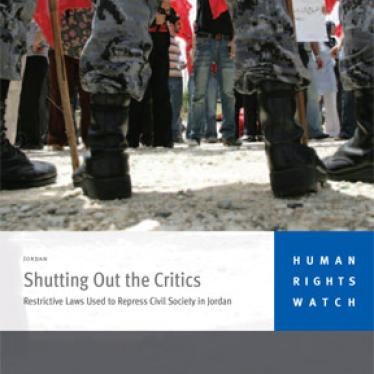Jordan should change its laws that severely restrict public assembly and the freedom and independence of nongovernmental organizations, Human Rights Watch said in a report released today.
In the 42-page report, “Shutting Out the Critics,” Human Rights Watch also called on the United States and the European Union to condition some funding to Jordan on changes in these laws.
“While promising to foster civil society, Jordanian authorities have instead made life more difficult for nongovernmental groups,” said Sarah Leah Whitson, Middle East director at Human Rights Watch. “The government is using oppressive laws and practices to shut out private citizens from peacefully participating in public policy debates.”
For six years, Jordan’s administrative governors have used restrictive laws to sharply reduce the freedom of individuals and organizations to meet, organize and demonstrate in public. Since 2001 the government has enforced a Law on Public Gatherings that defines a public gathering very broadly, encompassing any meeting between two persons even in a private home or office. It obliges organizers to seek advance permission from governors, who arbitrarily can prohibit gatherings without the possibility of appeal.
“Shutting Out the Critics” documents how governors have increasingly used this law to deny most requests for demonstrations deemed critical of the government, such as requests made in June 2007 to hold demonstrations against Israeli practices in the Occupied Palestinian Territories. The government also denied earlier requests to demonstrate against US practices in Iraq and to protest against the Jordanian government’s raising of domestic fuel prices. It highlights how the authorities have more recently gone further, even prohibiting nongovernmental organizations (NGOs) from meeting in rented facilities, for example to discuss an election monitoring coalition.
This year, the government has also cracked down on NGOs with two legislative initiatives that significantly impinge upon their ability to operate independently. In April, a new regulation imposed unnecessary and excessive restrictions on NGO funding from foreign and domestic sources. An NGO law proposed in October would bar any domestic or foreign donations to NGOs without prior government approval. The proposed law leaves almost unchanged the Ministry of Social Development’s unwarranted powers of control and interference over NGO affairs, including the power to license and dissolve them or take over their management.
The report documents several examples of government attempts to control independent NGOs. In 2006, the government took over the management of the Islamic Center Society and of the General Union of Voluntary Societies, two large and longstanding Jordanian NGOs, rather than simply prosecuting the individuals suspected of financial wrongdoing. In 2007, the government exerted pressure on an NGO to amend its proposed bylaws to reduce the scope of its proposed human rights work. Such governmental actions have made it much more difficult for NGOs to work independently and voice criticism of the government.
The US and EU together provided more than US$600 million in assistance to Jordan in 2006. Both donors have stated that their goal is to assist Jordan in developing its democratic institutions and strengthening civil society. Yet neither has developed the appropriate funding mechanisms, such as funding conditions, to ensure that Jordan’s laws and practices comply with international standards on the rights to freedom of assembly and of association. They have stood by and continued to fund the government while its laws and practices have increasingly interfered with NGO work. This undermines their financial support for local NGOs, which have less and less ability to work independently.
“It’s a futile exercise of misplaced philanthropy for the US and EU to be rewarding Jordan for continuing to restrict the activities of civil society groups,” Whitson said. “The US and EU should withhold funds to the government until the unnecessary restrictions are lifted.”
The restrictions on assembly and association in Jordan’s laws violate both the spirit of the Jordanian constitution and the letter of international law. Article 16 of Jordan’s constitution provides for the right to peaceful assembly and association. The International Covenant on Civil and Political Rights, which became law in Jordan in 2006, allows only for narrow and limited restrictions on these rights as are “necessary for national security or public safety, public order, the protection of public health or morals or the protection of the rights and freedoms of others.” Jordan’s broad limitations on the right to assembly and association do not meet these narrow criteria for permitted exceptions.







